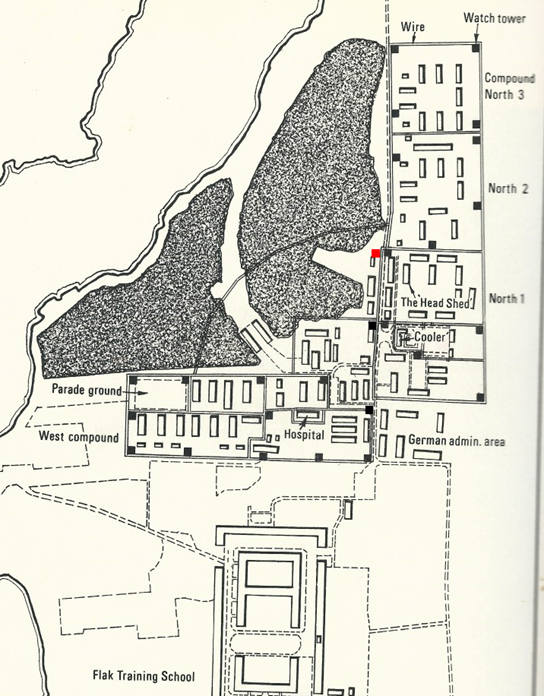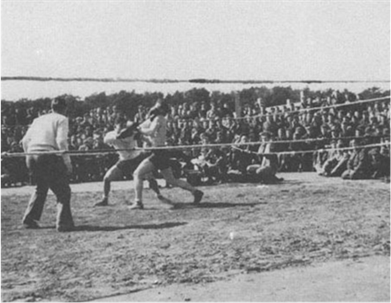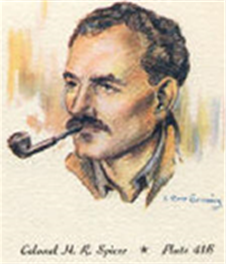
Daily Life in Stalag Luft I
Lieutenant Alan H. Newcomb of the USAAF was brought to Stalag Luft I in October 1944 and placed in compound North II. In his detailed diary entries, he reports on cultural events which were organized by the POWs. There was a music trio consisting of violin, accordion and banjo. A singing quartet performed regularly and there were also theater performances. In addition, the POWs organized different regular sport competitions such as boxing and soccer.
They received Red Cross parcels at regular intervals, but from fall 1944 onwards this supply stopped for many weeks until Christmas 1944, not at least because of the bombed infrastructure in Germany. The Christmas parcels contained small tins of turkey meat as well as plum pudding, jam, honey, Vienna sausages, ham, cheese, good butter, nuts, dates, candied cherries, chewing gum and a small game. All these delights were contained in a 5 kg package.
On Christmas Eve, there were several cultural events in the new dining room in compound North III. After the show, POWs exchanged small, funny gifts.
Alan Newcomb also mentions that former German world boxing champion, Max Schmeling, visited Stalag Luft I for a “good will tour” on 3 April 1945. He was signing autographs and handing out photos to anyone who was interested. Newcomb himself notes that he preferred to stay in the room because of a cold and the cold and wet weather.

(from http://www.merkki.com/images/boxing.jpg)
Also Lieutenant Wright Lee mentions Schmeling’s visit, when the champion strolled through the camp, accompanied by Senior Allied Officer, Zemke, eager to establish German-American relations.
Colonel Alan Henry Russell Spicer became Senior Compound Officer of North II in early 1944. He had commanded the 357th Fighter Group of the US Army Air Force. His plane was shot down by flak over the English Channel on 3 March 1944. Spicer was able to bail out with his parachute and landed in freezing water, but managed to get into the inflatable dinghy. As search and rescue teams did not discover him, he drifted in the sea for two days and landed on a beach near the French town of Cherbourg. He lay there with frostbite on his hands and feet until he was finally found by German soldiers. After medical treatment and interrogation, the Germans transferred him to Stalag Luft I in Barth.
On 31 October 1944 the German compound officer ordered all POWs to line up for roll call in cold, heavy rain. Spicer found this harassing and unreasonable and refused to obey the order. But after vehement threats, he had to follow. After about two hours the roll call was finally over and the temperamental, choleric and angry Spicer gathered his fellow prisoners around him in his barracks. He addressed his comrades with harsh words, such as: “They are a bunch of murderous, no-good liars, and if we have to stay here for fifteen years to see all the Germans killed, then it well be worth it.”

He talked very loudly so the German guards could hear him. As a result, Spicer was punished for inciting the camp to riot and for “insulting German honor” with 6 months of solitary confinement in the “Cooler”. In addition, the German camp commandant, Oberst Willibald Scherer, brought him to court-martial. This took place at the end of December 1944 and Spicer was sentenced to death. The sentence was to be carried out after three months in solitary confinement. Spicer was lucky, he was not killed and initially remained in the cooler after the German guards and staff personal retreated to the west to escape the rapidly approaching troops of the Red Army at around 10 p.m. on 30 April 1944. It was not until the next morning on first of May that the news spread rapidly throughout the camp that the Germans had gone: “The Germans are gone! The camp administration is in the hands of our officers under the leadership of Colonel Zemke!” One of the first orders was to release Colonel Spicer. Some American officers rushed to the “cooler” and unlocked the cell door. Spicer’s reaction took them completely by surprise. “I have to hold out here one more day,” he said, “I want to serve the whole damn six months.”
After the war, he continued to serve in the USAAF and reached the rank of a major general.